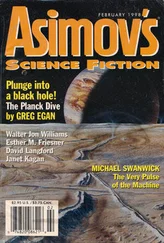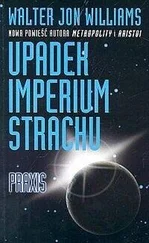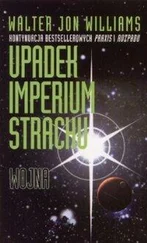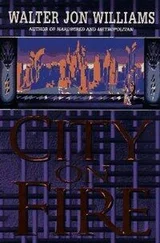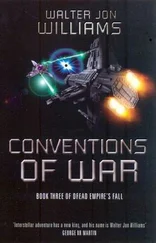“The pickled, my lord.” Martinez hated the stuff and would be glad to see the last of it.
The pickled cashment went into the hamper, followed by some canned butter biscuits, purple-black caviar from Cendis, and a wedge of blue cheese. “That should do it,” Tarafah said with satisfaction, then closed the heavy doors and locked them with his captain’s key.
The captain’s key opened the wardroom store and spirit locker, Martinez noted. Interesting.
The smoky odor of the cheeses floated up from the hamper, which sat on the narrow cherrywood table built to serveCorona’s three lieutenants and one or two of their guests. Martinez called up the inventory, and jotted the captain’s acquisitions onto the wardroom screen.
“My lord?” he said. “Would you sign for the stores?”
“I can’t sign. I’m not a member of the wardroom mess.”
Which was perfectly true. Martinez reflected that the captain certainly had the facts at his fingertips.
Time, he thought, for the query discreet.
“Are the captain’s stores running low, my lord?”
“No.” Offhand, as he tucked his key away into his tunic. “I’m contributing as well.”
“Contributing, Lord Elcap?”
Tarafah looked at him with impatience. “To our series of feasts for theSteadfast ‘s officers. They’re providing the officials and referees for the game, and it’s necessary to keep on their good side.”
“Ah. I see.”
“The chief referee is being very sensible about the offside rule. We need to keep him sweet.” Tarafah shouldered his way past Martinez and into the corridor that led to his own cabin. “Koslowski, Garcia, and I won’t be back till late. You’re on watch tonight, right?”
“Ah, no, my lord.” But Tarafah was out of earshot, followed by his orderly, before Martinez could explain that he’d just got off his double watch, and that the watch tonight would be kept byCorona’s master weaponer, who would be drinking himself into unconsciousness in Command while Cadet Vonderheydte performed all necessary watch-keeping tasks from an auxiliary station he’d set up forward, near the umbilical.
But Tarafah wasn’t interested in these arrangements, anyway.
Martinez watched the broad-shouldered back of the captain recede, then returned to the wardroom and signed out all missing stores as a “contribution to captain’s personal charity.” Then he signed out a can of caviar—the last—a tin of macaroons, another of crackers, a bottle of smoked red peppers, a duck preserved in its own fat, a brace of cheeses, a couple bottles of wine, and a bottle of brandy, from which he made a splendid cold meal, the remainder of which he stowed in his own cabin.
If he was going to be paying for someone else’s feast, the least he could do was have one of his own.
The exam proctor was a Daimong, and scented the room with the faint putrescence of her perpetually dying, perpetually renewed flesh. Strips of dry, light gray skin, weightless as the empty husks of insects, hung from the Daimong’s cuffs and long, long chin, and her round, deepset black eyes gazed at the assembled cadets with the fixed Daimong combination of melancholy and alarm.
“Electronic devices must now be turned off,” she said in her chiming voice. “Any electronic devices will be detected and the user marked down as a cheat.”
It would have been hard to smuggle electronic devices into the examination room in any case. The cadets—all in this room were Terran—wore their black examination robes, silk with viridian stripes for Peers, synthetics without markings for commoners. They had been made to change into these just moments ago, and their clothing was being held for them till the end of the day. The rest of the costume consisted of felt slippers and a soft, floppy round hat, the Peers’ version of which had a green pompon.
Sula supposed she might have smuggled some electronics in her underwear, but how she would read them past the densely woven black silk was beyond her imagination.
The Daimong checked the telltales on her electronic scanners. Apparently the result was satisfactory, because the next command was, “Activate your desks.”
Sula did so. The exams existed only in electronic form, and had been loaded into the desks only moments before by the proctor herself. Though the computers in the desks could be used to help solve problems, there was no information in their memories that could give the cadets any help beyond doing the numbers.
The first exam was mathematics—a snap, Sula reckoned. Then astrophysics, with an emphasis on wormhole dynamics, followed by theoretical and practical navigation, which was math and astrophysics combined. All things she prided herself as being good at.
The next day’s exams included history, military law, and engineering, all subjects in which she felt confidence. The third, final day featured tactical problems and the only exam for which Sula felt trepidation, “The Praxis: Theory, History, and Practice.” As the old joke went, it was the only exam where too many wrong answers could earn you the death penalty. Even though the Praxis was supposed to be eternal and unvarying, in practice the ground of interpretation tended to shift uneasily over time, and Sula had saved studying Praxis theory till last in hopes that her answers would reflect the current official line.
“You may toggle on the first question,” the Daimong said. “You have two hours and twenty-six minutes to complete the series.”
Sula toggled, and the first question appeared:
Under what circumstances does the identity
give the following:
The answer was obvious to her: whenx =x1,x2,x3, etc. andR4 (x) vanishes.
Then she read the question again to make sure there wasn’t something hidden in it.
Are they all going to be thiseasy? she wondered.
During the next afternoon watch in Command, Martinez made certain one of the displays showed the view from the security camera set outside the airlock. If the high command had a surprise inspection scheduled for his watch, he wanted to see it coming.
He had done his best to prepare. He’d told the first lieutenant, Koslowski, of his suspicions, and Alikhan had alerted the senior warrant and petty officers. As a result,Corona’s crew—at least those who weren’t involved in football—had joined Zhou, Ahmet, and Knadjian in furiously applying scrub brushes, polish, or lemon wax to every surface in sight.
Even the missiles in the tubes had been hand-buffed, and any scrapes from the automatic loaders to their special lawn-green paint had been repaired.
And now, Martinez saw, a party of Naxids was on its way, their scurrying, pounding feet driving them at their usual rocketing pace on the broad rubberized passage along the outside of the ring station. The party came to a lurching stop at the airlock of theSteadfast, the cruiser docked offCorona’s spinward flank. Through the display, Martinez could see their chameleon-weave jackets flashing as they looked atSteadfast ‘s airlock and at their sleeve displays.
He couldn’t imagine what they were doing. They certainly weren’t inspecting anything.
Martinez reached for the joystick that controlled the security camera and zoomed toward the Naxid party.
Kulukraf wasn’t in charge of this group, he saw: instead there was a senior captain, a half-dozen lieutenants, and—strangely—twice that number of warrant officers. They were going through the same routine Martinez had seen yesterday—pointing, conferring, flashing. Whatever they were up to, it required senior specialists. He was about to zoom in closer in order to distinguish the specialty patches on the warrant officers’ uniforms when the group moved, their scrabbling feet throwing their long bodies out of the camera frame.
Читать дальше

